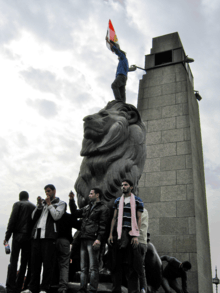
Our freedom is not up for negotiation. ~ Mohamed ElBaradei
The 2011 Egyptian revolution is a major political transition of the nation of Egypt, which involved a series of street demonstrations, marches, rallies, acts of civil disobedience, labour strikes, and some violent clashes. Partly inspired by the Tunisian revolution, it began on 25 January 2011, a day selected to coincide with the National Police Day.
Quotes
- Alphabetized by author
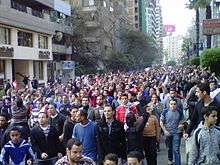
The People want to overthrow the regime.
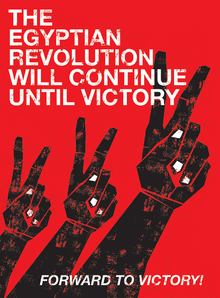
The Egyptian Revolution Will Continue Until Victory Forward To Victory
-edit2.jpg)
The people of Egypt have spoken, their voices have been heard, and Egypt will never be the same. ~ Barack Obama
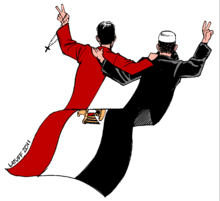
We saw people of faith praying together and chanting – “Muslims, Christians, We are one.” ~ Barack Obama
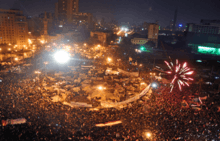
The word Tahrir means liberation. It is a word that speaks to that something in our souls that cries out for freedom. And forevermore it will remind us of the Egyptian people — of what they did, of the things that they stood for, and how they changed their country, and in doing so changed the world. ~ Barack Obama
- I hope that in Egypt there can be a transition toward a more democratic system without a break from President Mubarak, who in the West, above all in the United States, is considered the wisest of men and a precise reference point.
- Silvio Berlusconi, as quoted in Reuters news report posted as "Berlusconi: Hosni Mubarak Is 'The Wisest Of Men'", at The Huffington Post (4 February 2011), and in "Berlusconi: Mubarak is a wise man" at Al Jazeera (4 February 2011).
- We the people have legitimate demands and we would like to tell the government what to do. Our freedom is not up for negotiation. Secondly how can you negotiate with a regime that is killing its people? When the regime tries to counter a peaceful demonstration by using thugs, some of whom are police officers in plain clothes – we've seen their IDs – there are few words that do justice to this villainy and I think it can only hasten that regime's departure.
- The sooner Mubarak leaves, the better it is for everybody and the quicker we can restore normality and stability in Egypt and establish the cornerstone of democracy in the Middle East.
- Mohamed ElBaradei, as quoted in "Mohamed ElBaradei urges world leaders to abandon Hosni Mubarak" in The Guardian (2 February 2011).
- There are very few moments in our lives where we have the privilege to witness history taking place. This is one of those moments. This is one of those times. The people of Egypt have spoken, their voices have been heard, and Egypt will never be the same.
- I know that a democratic Egypt can advance its role of responsible leadership not only in the region but around the world.
Egypt has played a pivotal role in human history for over 6,000 years. But over the last few weeks, the wheel of history turned at a blinding pace as the Egyptian people demanded their universal rights.
We saw mothers and fathers carrying their children on their shoulders to show them what true freedom might look like.
We saw a young Egyptian say, “For the first time in my life, I really count. My voice is heard. Even though I’m only one person, this is the way real democracy works.”
We saw protesters chant “Selmiyya, selmiyya” — “We are peaceful” — again and again.
We saw a military that would not fire bullets at the people they were sworn to protect.
And we saw doctors and nurses rushing into the streets to care for those who were wounded, volunteers checking protesters to ensure that they were unarmed.
We saw people of faith praying together and chanting – “Muslims, Christians, We are one.” And though we know that the strains between faiths still divide too many in this world and no single event will close that chasm immediately, these scenes remind us that we need not be defined by our differences. We can be defined by the common humanity that we share.
And above all, we saw a new generation emerge — a generation that uses their own creativity and talent and technology to call for a government that represented their hopes and not their fears; a government that is responsive to their boundless aspirations. One Egyptian put it simply: Most people have discovered in the last few days…that they are worth something, and this cannot be taken away from them anymore, ever.
This is the power of human dignity, and it can never be denied. Egyptians have inspired us, and they’ve done so by putting the lie to the idea that justice is best gained through violence. For in Egypt, it was the moral force of nonviolence — not terrorism, not mindless killing — but nonviolence, moral force that bent the arc of history toward justice once more.- Barack Obama, in Remarks by the President on Egypt (11 February 2011).
- Today belongs to the people of Egypt, and the American people are moved by these scenes in Cairo and across Egypt because of who we are as a people and the kind of world that we want our children to grow up in.
The word Tahrir means liberation. It is a word that speaks to that something in our souls that cries out for freedom. And forevermore it will remind us of the Egyptian people — of what they did, of the things that they stood for, and how they changed their country, and in doing so changed the world.- Barack Obama, in Remarks by the President on Egypt (11 February 2011).
- Egypt pulls off a revolution in two weeks. Meanwhile, 20 years in, we’ve gotten nowhere on the whole “Kraft Cheese and Macaroni” thing.
Public Chants
- Sourcing for these are needed
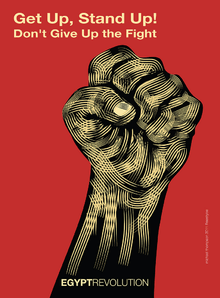
Get Up Stand Up! Don't Give Up The Fight.
- عيش، حرية، عدالة اجتماعية
- ""Bread, freedom, Social justice"".
- إرحل إرحل
- Leave Leave.
- مش هنمشي ، هو يمشي
- We won't leave, he leaves.
- ارحل يا فرعون
- Leave, O Pharaoh.
- الشعب يريد إسقاط النظام
- The People want to overthrow the regime.
- أمشی بقی یا عم خلی عندک دم
- Go already man have some blood ("Have some blood" is equivalent to the English saying "Have some dignity").
- الشعب و الجيش هيغيير الرئيس
- The people and the army are going to change the President.
- اذهب الى الجحيم
- Go to hell.
- أمس تونس و الیوم مصر
- Yesterday Tunisia, today Egypt.
External links
- Al Jazeera English - Live coverage (streaming)]
- Anger in Egypt - Al Jazeera English coverage
- Crowd-sourcing service used to cover the protests
- Juan Cole: "Egypt is a Praetorian Regime" - video by Democracy Now!
- Citizen Media coverage on Egypt Protests by Global Voices Online
- Egypt Resources at Google Crisis Response
- "Egypt Erupts, January 2011", LIFE magazine
- Vox Populi: a portal into web-based archives of voices from the Revolution
Live blogs
- Live Blog. Al Jazeera English.
- Unrest in Egypt. Reuters.
- Egypt Protests Live Blog. The Guardian.
- Latest Updates on Protests in Egypt. The New York Times.
This article is issued from
Wikiquote.
The text is licensed under Creative
Commons - Attribution - Sharealike.
Additional terms may apply for the media files.